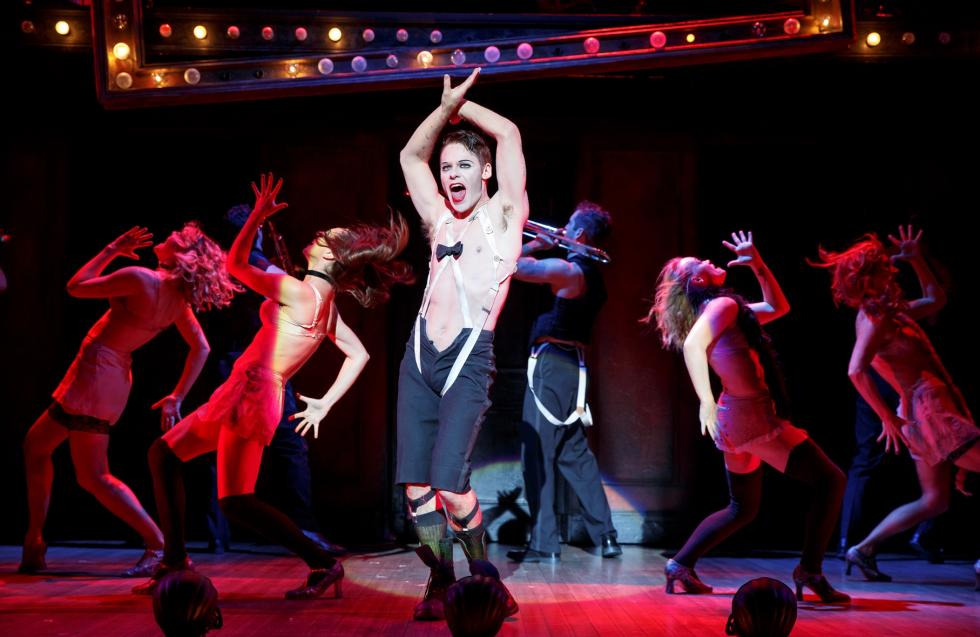Since its premiere on Broadway, Cabaret has become one of the biggest stage hits in modern history, even spawning an Oscar-winning film starring Liza Minnelli and Joel Grey. It isn’t just the incredible music that keeps audiences coming back; the themes of 1930’s Berlin are still relevant.
This week, Cabaret will begin its week-long run at the Hobby Center. We sat down and talked with Randy Harrison, who most may know as Justin from TV’s Queer As Folk. He is prepared to dazzle audiences in the iconic role of the Emcee, made famous by actors like Joel Grey and Alan Cumming.
Ryan Bellinghausen: The show has lasted so long. How has it evolved and stayed so relevant?
Randy Harrison: Good question. The show was written in 1966 and was attempting to draw parallels between the Civil Rights movement and 1929 Berlin. I think it’s very relevant because it makes people think about probably one of the biggest questions of the 20th Century, which is, “How did we allow the genocide of 11 million people?”
It has changed drastically because the 1966 version was a dark, smart, political play trying to be a musical comedy. I think society really needed to change to allow it to be what it needed to be. In the 1972 film version, the story is very different although it does have a lot of the same music. This version that we are doing began in 1987 on Broadway and goes back to the original story and recreates the cabaret scene from 1929.
RB: So then, what exactly has changed for this version from say the original 1966 version and other revivals?
RH: Musically some songs have been added and some have been taken away. Conceptually, my role has greatly expanded. I am not just a performer at the cabaret club, I am the instigator and move the play forward.
RB: How do you approach the Emcee character or put your own spin on it?
RH: I’ve watched everyone to see what he did and included it in my own take. I’ve seen Alan Cumming do it twice and grew up watching Joel Grey, so I find it very liberating to see what other actors did and let me see which aspects I wanted to bring to it. The more I include my own experiences, humor, and intelligence, the better it is going to be.
RB: Cabaret deals with the political terrain of Europe in the 20s and 30s. Do you think audiences will take anything away from that given our current political climate in the U.S. or overseas?
RH: I feel like it is impossible not to see the parallels. Different audiences take it different ways and regardless of your political beliefs, the show is relevant. It’s hard not to see the parallels of the use of bigotry, fear, hatred, and intimidation in politics, even today.
Even though we just started the tour, we have already performed in different areas with various political views and I don’t think it matters one way or another. There are lines that people think we wrote into the show because of what is happening in America right now and we tell them, “No, those have been in the show the entire time.”
RB: What do you want audiences to take away from the show?
RH: I would like people to see that in some ways there is a paper-thin barrier between any society and fascism or genocide. I know that is terrible, and we feel safe—like life is a cabaret and that would never happen here—but that is exactly what the characters in the show think. I think it is our responsibility, as an informed public, to be engaged socially and politically. There is a line that Cliff says in the show that is something like “If you are not against this, you are implicitly for it by letting it happen.”
RB: That reminds me of the quote that is something like, and I’m probably misquoting but, “When they came for the Jews, I did nothing. When they came for my neighbors, I did nothing. When they came for me there was no one left to speak up for me.”
RH: That is exactly what it is like. Growing up in Georgia, and gay in the 1990s, it wasn’t the people who harassed me that affected me the most but the people who stood by and let it happen.
A powerful and timeless musical, not to be missed. Tickets for Cabaret are still available for performances March 22-27 at the Hobby Theater. Come hear the music play.



